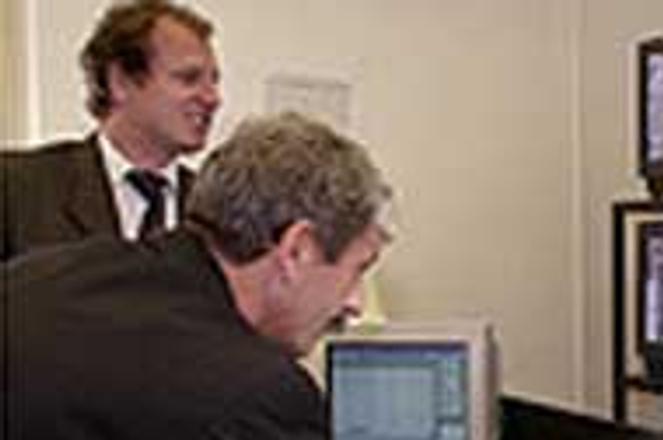A new security camera system was installed this spring to make the city safer: monitors were inspected by PM Mikuláš Dzurinda (above).photo: TASR
The life of a Slovak police officer is far from easy. Slovak citizens rarely have anything nice to say about their upholders of law and order, while foreigners and tourists may have little faith that the police are either interested or able to help them in need. Watchdog groups, too, accuse the police of not responding to Slovakia's escalating social problems such as racial violence and organised crime; criminals on the street seem undaunted by their presence, and politicians remain unsympathetic to their cries of under-funding and neglect.
"We're trying to do our best even though we know people believe the opposite," said Bratislava police captain Ján Jankovich, who spends three 12-hour shifts a week patrolling the streets of Bratislava in a squad car with his partner, first lieutenant Henrich Klačanský. "Many people don't realise how difficult our job is. Beside fighting our poor image, we have outdated equipment and large bureaucratic flaws in our legislation."
Despite these problems, however, the two career cops remain dedicated to their work and determined not to let prevailing attitudes get them down. Walking into a Bratislava café on a recent sweltering workday, the pair faced sarcastic comments and hard stares as they took a ten-minute break for kofola, a Slovak soft drink. "Oh, no money for a beer, huh?" one patron mocked.
"We're used to this, and we just ignore it," Klačanský shrugged. "But the bigger problem with this kind of attitude is that no one wants to cooperate with us. People fail to report crimes, and then complain that we're not doing our job. They expect us to know where and when crimes are going to happen."
Times were different under communism: police enjoyed full support from the government, which in turn relied heavily on them to maintain the status quo. Citizens had a respect that bordered on fear for the police. Although their hierarchical structure and protocol remained the same, law enforcement units had their funds drastically cut after the fall of communism in 1989, forcing them to work on scant funds but still meet the same expectations.
Further complicating their situation has been the upsurge of crimes foreign to the communist regime. Mafia groups took root throughout the 90s, their brutal internal wars being carried out at main public gathering points. For example, in 1997 one man was injured when gangsters shot him in broad daylight in Bratislava's Hotel Danube - he was later killed at Kramáre hospital when a sniper shot him through the window as he lay in his hospital bed. In 1999 two men wre shot dead at the Dubliner Irish pub, a hotspot for expats in Bratislava, and this year a man was murdered outside La Dolce Vita restaurant in the Old Town.
The police have drawn significant criticism for not doing more to combat the rising tide of crime. Jankovich and Klačanský, for their part, say that beat cops have little or no control over the big time Mafia criminals, and are afraid just like everybody else. "It's no good to challenge them because then we'll just get death-threats in return," said Klačanský.
Smaller-time criminals, such as money-changers that harass tourists, pose a different problem. "We can't do anything about them, because even though we may know what they're up to, we can't arrest them for just standing there. The same principle applies to prostitutes on the streets."
Bratislava police have also drawn criticism for standing idly by while a wave of racial attacks have left many of Bratislava's dark-skinned foreigners afraid to leave their homes. As recently as June 18, in fact, the police were criticised by Mária Čierna, spokesperson for the United Nations High Council for Refugees in Bratislava, when three Afghans were beaten at an Old Town music concert for refugees. Čierna said that officers at the scene had "stood by for two or three minutes while the beatings took place."
Other verbal attacks on the police continue from other fronts: "When there is such open violence, clearly unlawful yet on the rise, that means the police are simply not doing their work," said Sayon Camara, founder of an association of African-Slovak families called Zebra which has documented 20 violent racial attacks in Bratislava since January (see related story, front page). "In most cases the police simply chase attackers away and make no attempt to apprehend them. Furthermore, we know of instances where police have actually joined in on the assault."
Such accusations are roundly denied by the police. "We strongly deny accusations that police don't care about racial problems," said Marta Bujňáková, spokesperson for the Bratislava 1 regional police headquarters. "One of the main problems we have is that no one reports attacks and even fewer press charges." Despite her department's efforts, however, she recommended that dark skinned foreigners travel in groups and avoid areas frequented by skinheads.
With the public and the police at a standoff, the former believing the latter don't care and police saying they don't have the tools or support to do their jobs any better, little will improve according to Jankovich and Klačanský unless the public begins to trust law enforcers and take an active part in reducing crime.
Police say also that foreigners or tourists have a role to play in making the capital safer, and in the event of racial violence or other forms of crime should immediately dial 158, an emergency help-line. If they don't know Slovak, they should try to name the street they are on or a nearby landmark. Police officers are all trained in basic English and German phraseology. Beyond that, police keep a database of translators they contact when necessary.


